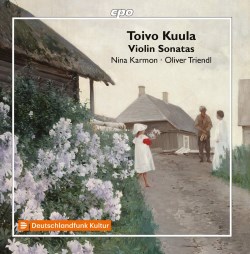Kuula Violin Sonatas CPO 555 148-2 [JW] Classical Music Reviews: December 2018 (original) (raw)

Toivo KUULA (1883-1918)
Violin Sonata in E Minor, Op. 1 (1907) [28:40]
Five Pieces for violin and piano, Op. 3a (1905-07) [15:12]
Ut min v�g i v�rlden g�r (I go my way into the world) arr. for violin and piano (1901) [1:08]
El� itke impeni nuori (Cry not, young maiden) arr. for violin and piano [1:03]
Violin Sonata in F Major (1906) [10:21]
Two Pieces for violin and piano, Op. 22 (1910-12) [8:32]
South Ostrobothnian Suite No. 1, Op. 9 [2:07]
Kes�ilta (Summer Evening) (1907) [1:59]
Nina Karmon (violin)
Oliver Triendl (piano)
rec. 2017, Deutschlandfunk Kammermusiksaal, Cologne
CPO 555 148-2 [70:34]It’s good to see that Toivo Kuula’s representation on disc is growing, not least because of the tragic circumstances of his early death which inevitably meant a circumscribed work list. Some will have come to him through his teacher, Sibelius, wondering perhaps whether there is a detectable stylistic lineage. Others may be intrigued by his admiration for and admixture of folkloric influences. Whatever the reasons, Kuula’s music will repay repeated hearings.
The Violin Sonata in E minor is a subtle work in which the ear is drawn as much to the piano’s romantic outbursts as to the violin’s post-Grieg songfulness. Rhythmic variety and sunlit lyricism mark out the territory, as well as robust writing in the first movement development section. The haunting Finnish folk chant in the Adagio ushers in a deeper strain of feeling, ardent warmth full of beautiful meditative breadth but also structural cohesion. With a fresh-air finale that oscillates between gentle reflection and straight-talking drama, as well as a stalking fugato that thankfully doesn’t outstay its welcome, this is a sonata with a lot of charm going for it.
The Sonata in F major is, in truth, the solitary completed movement of a projected full-scale work. Its romantic geniality sounds rooted in Schumann and once again the piano’s rhythmic vivacity is never subservient to the violin. The atmospheric Five Pieces, Op.3a offer diverse and appealing morceaux. The first is a folkloric lullaby and the second a Nocturne replete with tight double-stopping demands. Two are arrangements of folk songs whilst the cycle ends with the jolliest of Scherzinos.
The two song transcriptions offer the kind of compact melancholy to be found by the evening fireside. A tautly passionate Christmas Carol is the first of the two Pieces, Op.22 and its opus mate is a notably virtuosic and passionate Suru (Sorrow), with powerful piano chording and strong fiddle runs. Brief and vibrant, the Ostrobothnian Dance contrasts with the concluding Kes�ilta (Summer Evening); this last is a real charmer of a piece.
The scrupulously written notes tend to major on the ‘a slower subordinate theme in G sharp minor’ lines but that’s very much a CPO trademark. As for the recording itself, it’s attractive but the piano is just a little too forward in the balance for my ears, especially as Oliver Triendl can over-part Nina Karmon, who doesn’t have a particularly big tone. But she does have persuasive powers of reportorial sympathy and stylistic assurance.
Jonathan Woolf
Previous review: Rob Barnett